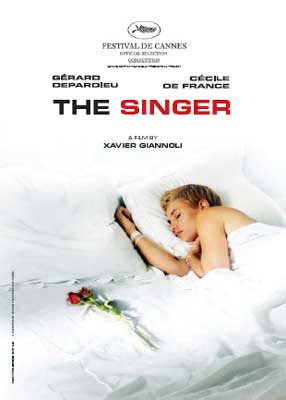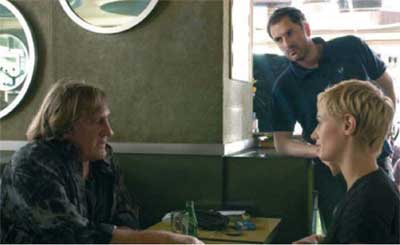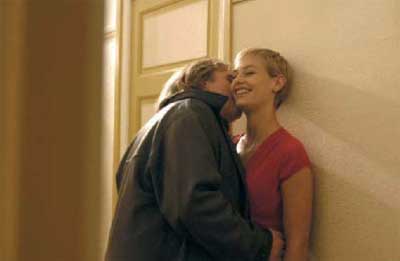Gerard Depardieu The Singer Interview

THE SINGER is a tender and poignant romance starring the remarkable Gérard Depardieu as a faded, middle-aged dance hall vocalist who falls for beautiful yet unhappy woman half his age, played by Cecile de France (Russian Dolls.)
Widely feted at the 2006 Cannes Film Festival, THE SINGER features Depardieu's best performance since Cyrano de Bergerac. He portrays fifty-something Alain Moreau, a small-time crooner who sings sentimental favourites in a dance hall till 3:30am. A hardened, honest professional, he knows his style seems dated, but only because he's lasted the course. One night, Alain spots a beautiful young blonde, Marion (de France) and, with quiet persistence and a frank, self-deprecating attitude, manages to capture her imagination. But the fragile Marion has problems of her own and is cautiously unwilling to fall too easily for his evidently practised charms.
The expected clichés in this story never surface; indeed, the emotional chemistry and fluidity between all of the characters is but one of the film's real joys. A love story of generous heart, THE SINGER never hits a false note.
Gerard Depardieu: It was a surprise to meet somebody in this business who had a clear vision, sharp mind, knew what he was talking about and was endowed with boundless love for cinema and song. Xavier has a fine knowledge of movies. What I mean by that is that he is eclectic, open to all kinds of genres, with, generally, a critical and polemical mind that I appreciate. So, he's a young man of temperament with a character that appears very difficult but is actually just a consequence of his perfectionism. What he does is like nothing other than himself. That's why, when he sent me the script of The Singer, I said yes right away. There is no message to get across other than the energy of a young, independent director who has a story to tell. Everything else is incidental.
What was your initial impression of the story?
Gerard Depardieu: That it was very beautiful and written by someone who knew what he was talking about. The authenticity of the dialogue reminded me of the films that I love. It is stamped with a very poetic respect for dance hall singers in Clermont-Ferrand or anywhere else. I didn't see in it the condescending, metropolitan attitude that a lot of pretentious young directors would have shown. Then I saw Xavier leading a crew that he seemed to be used to working with, demanding the highest standards of everybody without being overbearing.
What kind of high standards?
Gerard Depardieu: Talented directors are often preceded by a fearful reputation. So, Giannoli was reputed to be harsh and uncompromising... Xavier isn't harsh. He's very fair. He is both difficult and charming because he is full of intelligence and hugely sensitive. He's likable and, above all, discreet, with a strong personality and an obsessive side, which means he never short-changes his script because it's sufficiently well thought through that it doesn't need to be rethought. He has developed his own method of production and so remains very independent in his work. He has a good sense of humor, too we often laughed over the same things.
 Were you apprehensive about playing a singer?
Were you apprehensive about playing a singer?
Gerard Depardieu: Alain Moreau is a man who likes tunes and songs and who simply makes people dance. In this instance, it wasn't any tougher to perform Gainsbourg's songs than Christophe's or anybody else's. The whole point wasn't to mimic them but to play Alain Moreau performing them in his own way. Thank goodness because it's harder to be Michel Delpech than Alain Moreau singing Michel Delpech's songs. Real chansons are poems. In François Truffaut's The Woman Next Door, Mathilde says, "Songs tell the truth." Appreciating their true value requires great sensitivity. Which Alain Moreau possesses.
Did you meet Alain Chanone, Xavier's reference for Alain Moreau?
Gerard Depardieu: Of course. And I've known others like him. He's a guy whose passion drives him. A good guy. It felt good, having him around, as well as all the other real-life characters from the dance hall world.
Did you and Xavier talk over the songs you would perform in the film?
Gerard Depardieu: Yes, mind you, I knew them all well. Barbara always used to tell me that singing a chanson is a unique art. A singer on tour sets out on an exhilarating adventure. Sometimes it can be hard coming back down to earth. Alain Moreau is more interesting than that. He knows that world, but he prefers his small world of people who come to dance to him. He knows that he can never be a star. Does he actually want to be one? Isn't that what makes him so different, so human? He lives with his goat, his sun lamp, and his melancholy. The only thing that can upset his solitude is love. You sense that he had someone, but it's something that is constantly on the verge of ending. The proof comes with his interludes with his ex-wife, played by Christine Citti. With Marion, it's different. She belongs to another generation.
She escapes him. She's more lucid, peremptory, abrupt... The total opposite of Cécile de France! She's so sweet, open, and sensitive! A wonderful woman. She is delightfully free. Upbeat and incredibly aware. Maybe it has something to do with being Belgian? I wish her a lot of happiness.
One gets the sense that you laid yourself open in this film as you haven't done for a long time?
Gerard Depardieu: In a different way, sure. There are people who get scared and others who make use of what you bring to the table. I'm not impressive. Only idiots are impressed. When people are themselves, there's no worry. Parisians have no sense of reality, authenticity or mystery anymore. At no point does Giannoli judge the characters he is filming. He loves them in the same way Jean Renoir would have loved them. You come out of this film bigger, raised up. First of all, it's enjoyable, partly because of the songs whose significance isn't immediately obvious. And then for the identity that is inherent to auteur movies, in which the viewpoint ennobles the audience. After all, this is the story of a man who wants to make people happy. There's nothing greater. I was equally moved when I first saw it as when I first read it. Especially by the intelligence of the directing and the unobtrusive rigor in the dramatic structure. Purely technical performances depend on their coherence with the situation. When it's strong, there is no need for any effects.
 It's almost as if the line, "Each time everyone thinks I'm done for, I bounce back" was written for you...
It's almost as if the line, "Each time everyone thinks I'm done for, I bounce back" was written for you...
Gerard Depardieu: We're always the first to think that. It's a simple and very strong line. In any case, the guy who believes he has talent is dead. He doesn't survive thanks to other people, but through the motivation that he puts into his work. Our personal talent only becomes visible when it escapes us. It's the same with a director: if there's no love in what he's attempting to achieve, it has no hope. Nobody can give grace without love.
Widely feted at the 2006 Cannes Film Festival, THE SINGER features Depardieu's best performance since Cyrano de Bergerac. He portrays fifty-something Alain Moreau, a small-time crooner who sings sentimental favourites in a dance hall till 3:30am. A hardened, honest professional, he knows his style seems dated, but only because he's lasted the course. One night, Alain spots a beautiful young blonde, Marion (de France) and, with quiet persistence and a frank, self-deprecating attitude, manages to capture her imagination. But the fragile Marion has problems of her own and is cautiously unwilling to fall too easily for his evidently practised charms.
The expected clichés in this story never surface; indeed, the emotional chemistry and fluidity between all of the characters is but one of the film's real joys. A love story of generous heart, THE SINGER never hits a false note.
Interview
How did Xavier Giannoli describe this role to you?Gerard Depardieu: It was a surprise to meet somebody in this business who had a clear vision, sharp mind, knew what he was talking about and was endowed with boundless love for cinema and song. Xavier has a fine knowledge of movies. What I mean by that is that he is eclectic, open to all kinds of genres, with, generally, a critical and polemical mind that I appreciate. So, he's a young man of temperament with a character that appears very difficult but is actually just a consequence of his perfectionism. What he does is like nothing other than himself. That's why, when he sent me the script of The Singer, I said yes right away. There is no message to get across other than the energy of a young, independent director who has a story to tell. Everything else is incidental.
What was your initial impression of the story?
Gerard Depardieu: That it was very beautiful and written by someone who knew what he was talking about. The authenticity of the dialogue reminded me of the films that I love. It is stamped with a very poetic respect for dance hall singers in Clermont-Ferrand or anywhere else. I didn't see in it the condescending, metropolitan attitude that a lot of pretentious young directors would have shown. Then I saw Xavier leading a crew that he seemed to be used to working with, demanding the highest standards of everybody without being overbearing.
What kind of high standards?
Gerard Depardieu: Talented directors are often preceded by a fearful reputation. So, Giannoli was reputed to be harsh and uncompromising... Xavier isn't harsh. He's very fair. He is both difficult and charming because he is full of intelligence and hugely sensitive. He's likable and, above all, discreet, with a strong personality and an obsessive side, which means he never short-changes his script because it's sufficiently well thought through that it doesn't need to be rethought. He has developed his own method of production and so remains very independent in his work. He has a good sense of humor, too we often laughed over the same things.
 Were you apprehensive about playing a singer?
Were you apprehensive about playing a singer? Gerard Depardieu: Alain Moreau is a man who likes tunes and songs and who simply makes people dance. In this instance, it wasn't any tougher to perform Gainsbourg's songs than Christophe's or anybody else's. The whole point wasn't to mimic them but to play Alain Moreau performing them in his own way. Thank goodness because it's harder to be Michel Delpech than Alain Moreau singing Michel Delpech's songs. Real chansons are poems. In François Truffaut's The Woman Next Door, Mathilde says, "Songs tell the truth." Appreciating their true value requires great sensitivity. Which Alain Moreau possesses.
Did you meet Alain Chanone, Xavier's reference for Alain Moreau?
Gerard Depardieu: Of course. And I've known others like him. He's a guy whose passion drives him. A good guy. It felt good, having him around, as well as all the other real-life characters from the dance hall world.
Did you and Xavier talk over the songs you would perform in the film?
Gerard Depardieu: Yes, mind you, I knew them all well. Barbara always used to tell me that singing a chanson is a unique art. A singer on tour sets out on an exhilarating adventure. Sometimes it can be hard coming back down to earth. Alain Moreau is more interesting than that. He knows that world, but he prefers his small world of people who come to dance to him. He knows that he can never be a star. Does he actually want to be one? Isn't that what makes him so different, so human? He lives with his goat, his sun lamp, and his melancholy. The only thing that can upset his solitude is love. You sense that he had someone, but it's something that is constantly on the verge of ending. The proof comes with his interludes with his ex-wife, played by Christine Citti. With Marion, it's different. She belongs to another generation.
She escapes him. She's more lucid, peremptory, abrupt... The total opposite of Cécile de France! She's so sweet, open, and sensitive! A wonderful woman. She is delightfully free. Upbeat and incredibly aware. Maybe it has something to do with being Belgian? I wish her a lot of happiness.
One gets the sense that you laid yourself open in this film as you haven't done for a long time?
Gerard Depardieu: In a different way, sure. There are people who get scared and others who make use of what you bring to the table. I'm not impressive. Only idiots are impressed. When people are themselves, there's no worry. Parisians have no sense of reality, authenticity or mystery anymore. At no point does Giannoli judge the characters he is filming. He loves them in the same way Jean Renoir would have loved them. You come out of this film bigger, raised up. First of all, it's enjoyable, partly because of the songs whose significance isn't immediately obvious. And then for the identity that is inherent to auteur movies, in which the viewpoint ennobles the audience. After all, this is the story of a man who wants to make people happy. There's nothing greater. I was equally moved when I first saw it as when I first read it. Especially by the intelligence of the directing and the unobtrusive rigor in the dramatic structure. Purely technical performances depend on their coherence with the situation. When it's strong, there is no need for any effects.
 It's almost as if the line, "Each time everyone thinks I'm done for, I bounce back" was written for you...
It's almost as if the line, "Each time everyone thinks I'm done for, I bounce back" was written for you... Gerard Depardieu: We're always the first to think that. It's a simple and very strong line. In any case, the guy who believes he has talent is dead. He doesn't survive thanks to other people, but through the motivation that he puts into his work. Our personal talent only becomes visible when it escapes us. It's the same with a director: if there's no love in what he's attempting to achieve, it has no hope. Nobody can give grace without love.
MORE





